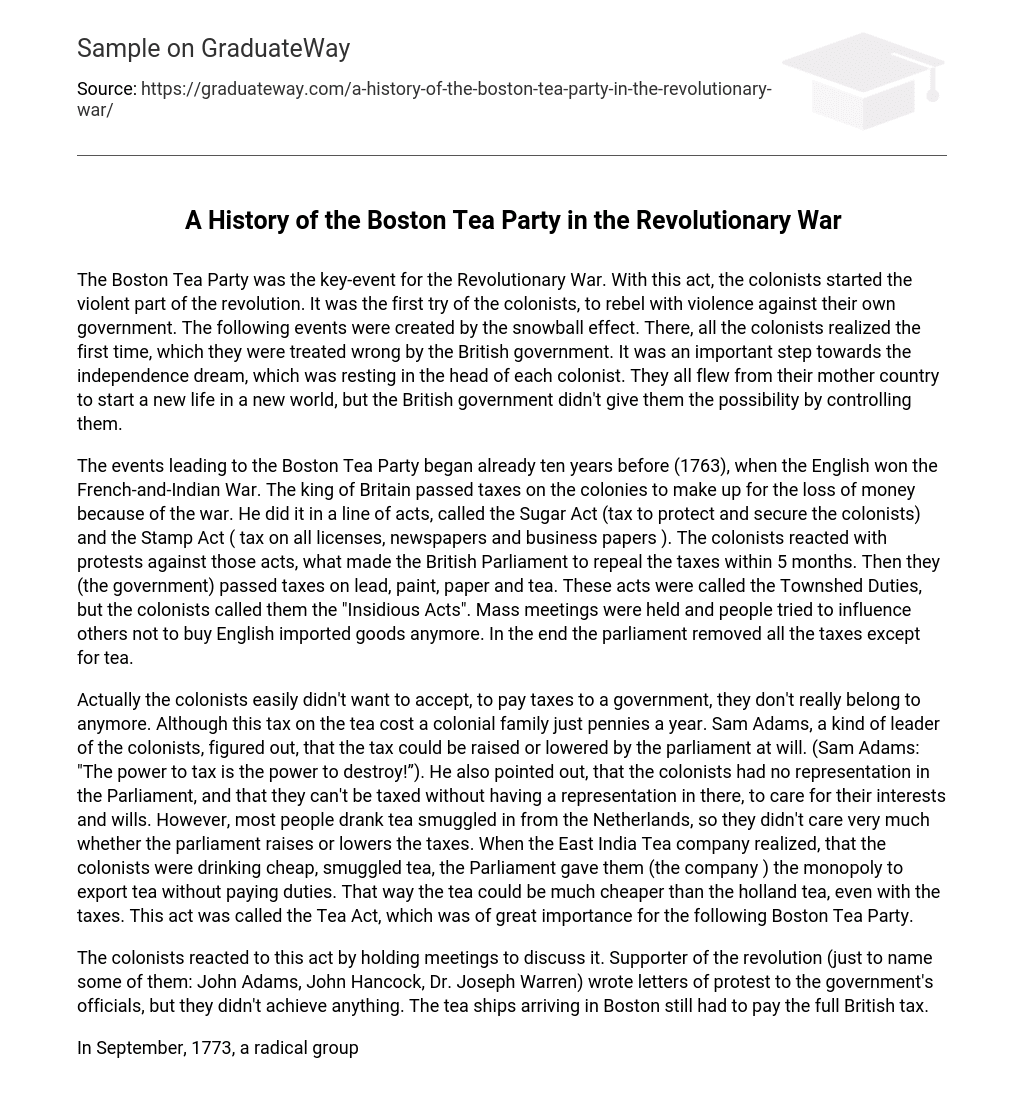The Revolutionary War was started by the Boston Tea Party, a violent act of rebellion by colonists against their own government. This event set off a chain of events known as the snowball effect, during which colonists collectively recognized their mistreatment by the British government. This realization fueled their longing for independence, which was shared by all colonists. Despite seeking a fresh start in a new land, the British government imposed control and hindered their growth.
The events leading to the Boston Tea Party began a decade earlier in 1763, following the English victory in the French-and-Indian War. To compensate for the financial loss from the war, the king of Britain implemented taxes on the colonies through a series of acts – the Sugar Act (a tax to protect and secure colonists) and the Stamp Act (a tax on licenses, newspapers, and business papers). The colonists responded with protests against these acts, leading the British Parliament to repeal the taxes within five months. However, the government subsequently introduced new taxes on lead, paint, paper, and tea known as the Townshed Duties, which were referred to by colonists as the “Insidious Acts”. Mass meetings were convened, urging people to boycott English imported goods. Eventually, all taxes were abolished except for those on tea.
Actually, the colonists were not eager to pay taxes to a government they no longer felt connected to. However, even though the tax on tea only cost colonial families a few pennies annually, Sam Adams, a leader among the colonists, recognized that the parliament could manipulate the tax rates at their discretion (Sam Adams: “The power to tax is the power to destroy!”). Adams also pointed out that since the colonists had no representation in parliament, they should not be taxed without having a voice to protect their interests and desires. However, most people preferred to drink smuggled tea from the Netherlands and were not overly concerned with whether the taxes were raised or lowered by parliament. When the East India Tea Company discovered that the colonists were consuming cheaper smuggled tea, parliament granted the company a monopoly on exporting tea without paying duties. This allowed the tea to be much cheaper than Dutch tea, even with taxes applied. Referred to as the Tea Act, this legislation played a significant role in the subsequent Boston Tea Party.
The colonists responded to this act by convening meetings to discuss it. Supporters of the revolution, such as John Adams, John Hancock, and Dr. Joseph Warren, expressed their dismay through letters to government officials. However, their efforts were unsuccessful as the tea ships arriving in Boston were still required to pay the full British tax.
In September 1773, a group of radical colonists learned that three East India tea cargo ships were on their way to Boston with a significant amount of tea. They understood that unloading the ships and paying the tax would lead to a disastrous loss.
The radical group made an unsuccessful attempt to force the agents of the East India Company to resign in front of a large audience. In the following weeks, propaganda speeches were delivered to spread information about the events among all colonists. Certain individuals even abandoned their longstanding tea-drinking habit and switched to coffee consumption instead.
On November 18th, 1773, the ships arrived and pamphlets were posted to arrange a meeting between the citizens and Governor Hutchinson. Governor Hutchinson, also known as the “Committee of Correspondence”, was urged during this meeting to send the ships back to Britain. However, when he refused, a group of men dressed as Indians took matters into their own hands and headed towards the harbor. These men were organized into three groups, each with their own leader.
One ship’s captain and crew were successfully forced below deck by these men, who then proceeded to open and throw overboard all the tea chests. To everyone’s surprise, some members of the crew even assisted in destroying the tea. A large crowd gathered in the harbor, with some individuals attempting to steal tea for themselves. In total, 340 chests of tea were destroyed during this event.
By 10:00 pm, everything had concluded and Boston’s streets once again became empty. The following day brought jubilation among people planning on publicizing this significant event throughout all colonies in America.
The British Government’s response to the situation was referred to as the “Intolerable Acts.” In an effort to restrict Boston, 4000 British soldiers closed the Boston Harbor, preventing the city from receiving necessary supplies. However, this attempt was unsuccessful as other colonists sent food and essential goods to support the citizens of Boston. Additionally, they formed a militia to defend against the British army. Furthermore, gatherings and meetings were prohibited in Boston.





